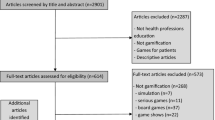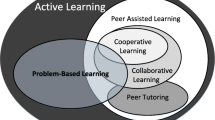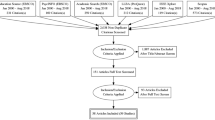Abstract
We investigated a participatory design of rehabilitation technology for people with disabilities. Conventionally, rehabilitation technology is designed through the collaboration of medical experts and professional engineers. Potential users of the technology are introduced only at the testing stage after the proof of concept has been established and working prototypes have been constructed, leading to insufficient scope for modification. However, rehabilitation technology that does not address the needs of people often results in decreased efficacy and its eventual nonuse. In our study, we used action research to guide the development of rehabilitation technology. People with disabilities were invited to participate in designing the assistive technology at the outset of the project and played the role of experts in living with disabilities. They acted as resources and assets in the process of developing and validating the technology.
Similar content being viewed by others
References
Access Economics Pty Ltd (2008) The growing cost of obesity in 2008: three years on. Report for diabetes Australia. Access Economics Pty Ltd, Canberra
Anderson KN, Anderson LE, Glanze WD (1998) Mosby’s medical dictionary, 5th edn. Mosby, St. Louis
Bond GR, Drake RE, Mueser KT, Becker DR (1997) An update on supported employment for people with severe mental illness. Psychiatr Serv 48:335–346
Bond GR, Drake RE, Becker DR (2008) An update on randomized controlled trials of evidence-based supported employment. Psychiatr Rehabil J 31:280–290
Carmien S, Dawe M, Fischer G, Gorman A, Kintsch A, Sullivan JF (2005) Socio-technical environments supporting people with cognitive disabilities using public transportation. ACM Trans on Computer-Human Interaction 12(2):233–262
Chang YJ, Wang TY (2010a) Mobile location-based social networking in supported employment for people with cognitive impairments. Cybernetics and Systems: An International Journal 41(3):245–261
Chang YJ, Wang TY (2010b) Indoor wayfinding based on wireless sensor networks for individuals with multiple special needs. Cybernetics and Systems: An International Journal 41(4):317–333
Chang YJ, Liao RH, Wang TY, Chang YS (2010) Action research as a bridge between two worlds: Helping the NGOs and humanitarian agencies adapt technology to their needs. Syst Pract Action Res 23(3):191–202
Chang YJ, Chen SF, Chuang AF (2011a) A gesture recognition system to transition autonomously through vocational tasks for individuals with cognitive impairments. Res Dev Disabil 32(6):2064–2068
Chang YJ, Chen SF, Huang JD (2011b) A Kinect-based system for physical rehabilitation: a pilot study for young adults with motor disabilities. Res Dev Disabil 32(6):2566–2570
Chang YJ, Wang TY, Chen YR (2011c) A location-based prompting system to transition autonomously through vocational tasks for individuals with cognitive impairments. Res Dev Disabil 32(6):2669–2673
Chang YJ, Wang TY, Chen SF, Liao RH (2011d) Student engineers as agents of change: combining social inclusion in the professional development of electrical and computer engineering students. Syst Pract Action Res 24(3):237–245
Chang YJ, Chou LD, Wang FTY, Chen SF (2013a) A kinect-based vocational task prompting system for individuals with cognitive impairments. Pers Ubiquit Comput 17(2):351–358
Chang YJ, Han WY, Tsai YC (2013b) A Kinect-based upper limb rehabilitation system to assist people with cerebral palsy. Res Dev Disabil 34(11):3654–3659
Chang YJ, Kang YS, Huang PC (2013c) An augmented reality (AR)-based vocational task prompting system for people with cognitive impairments. Res Dev Disabil 34(10):3049–3056
Chang YJ, Kang YS, Liu FL (2014) A computer-based interactive game to train persons with cognitive impairments to perform recycling tasks independently. Res Dev Disabil 35(12):3672–3677
Crowther RE, Marshall M, Bond GR, Huxley P (2001) Helping people with severe mental illness to obtain work: systematic review. BMJ 322:204–208
Friedman VJ (2008) Action science: creating communities of inquiry in communities of practice. Sage Publications, Thousand Oaks, pp 131–143
Kennedy CH (2005) Single-case designs for educational research. Allyn and Bacon, Boston
Kleim J, Jones T, Schallert T (2003) Motor enrichment and the induction of plasticity before or after brain injury. Neurochem Res 28(11):1757–1769
Liu L, Hile H, Kautz H, Borriello G, Brown PA, Harniss M, Johnson K (2006) Indoor wayfinding: developing a functional interface for individuals with cognitive impairments. Proceedings of Computers & Accessibility, ASSETS 2006, pp.95–102.
Longhurst R (2003) Semi-structured interviews and focus groups. In: Clifford N, Valentine G (eds) Key methods in geography. Sage Publications, London, pp 117–132
Maskell P (2000) Social capital, innovation, and competitiveness. In: Social capital (pp. 111–123). Oxford University Press.
Meyer J (2000) Using qualitative methods in health related action research. Br Med J 320(7228):178
O’Sullivan G, Hocking C, Spence D (2014) Action research: changing history for people living with dementia in New Zealand. Action Res 12(1):19–35
Phinney A (2008) Toward understanding subjective experiences of dementia. In: Downs M, Bowers B (eds) Excellence in dementia care: research into practice. Open University, Berkshire, pp 35–51
Richards SB, Taylor RL, Ramasamy R, Richards RY (1999) Single subject research: applications in educational and clinical settings. Wadsworth, New York
Rolfsen M, Johnsen A, Knutstad G (2007) Action engagement: improving researchers’ involvement in action research projects. Syst Pract Action Res 20:53–63
Sabat SR (2011) A bio-psycho-social model enhances young adults’ understanding of and beliefs about people with Alzheimer’s disease: a case study. Dementia 1471301211416612
Smeltzer SC (2010) Improving health and wellness of people with disabilities. In: Stone JH, Blouin M (eds). International encyclopedia of rehabilitation. Available online: http://cirrie.buffalo.edu/encyclopedia/en/article/300/
Wessels R, Dijcks B, Soede M, Gelderblom GJ, de Witte L (2003) Non-use of provided assistive technology devices, a literature overview. Technol Disabil 15:231–238
Acknowledgements
The authors pay tribute to the participants who willingly dedicated their time and knowledge, trusting that the information they shared would be used to help others. Without their involvement, cooperation, reflections, constructive criticism, and feedback, this research would not have been possible.
Author information
Authors and Affiliations
Corresponding author
Rights and permissions
About this article
Cite this article
Kang, YS., Chang, YJ. Sharing the Voice and Experience of our Community Members with Significant Disabilities in the Development of Rehabilitation Games. Syst Pract Action Res 32, 1–12 (2019). https://doi.org/10.1007/s11213-018-9449-8
Published:
Issue Date:
DOI: https://doi.org/10.1007/s11213-018-9449-8




